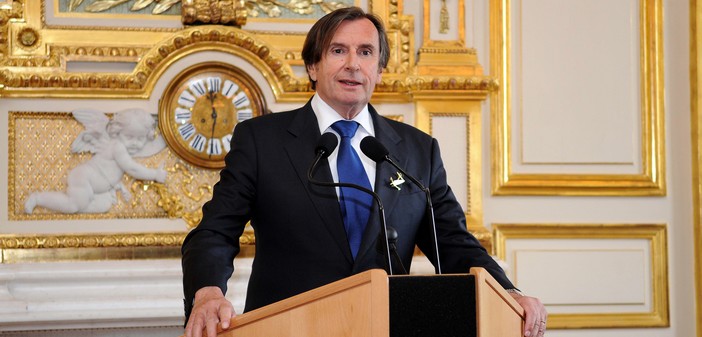The Jacques Audiberti Prize was created in 1989 to honor a writer whose work is inspired by the Mediterranean.
Jacques Audiberti was a French poet, writer, and playwright, born in Antibes on March 25, 1899, and died in Paris in 1965. The villa Eilenroc at Cap d’Antibes is the usual setting for this literary event.
This year, for its 26th edition, Daniel Rondeau is the laureate.
This writer, journalist, and diplomat received his award this Friday, November 13, in front of an audience of journalists and under the presidency of Mr. Jean Leonetti, deputy mayor of Antibes, and Mr. Didier Van Cauwelaert, president of the Jacques Audiberti Prize jury.
The latter spoke of the life, work, and adventures of this writer who, in some ways, reminds one of Jean Raspail with his adventures, including this cruise in the Mediterranean, a cruise not for leisure, but for discovering the other. In Libya with students, Daniel Rondeau would evoke Albert Camus, another writer who was wholehearted and passionate.
Didier Van Cauwelaert concluded his tribute to the recipient with a phrase that is particularly relevant in this individualistic and selfish world: “One feels a great sense of brotherhood through the work of Daniel Rondeau.” Daniel Rondeau sums up his destiny in one sentence: “As a child, my only vocation was to be a writer.”
The author reflects on his training at the factory, where he learned about life and discovered his innate ability to adapt to others, to different people. “I get along with others!” The writer talks about himself, which is a difficult exercise, and he manages to avoid the two pitfalls of self-portraits: being Narcissus or being too modest.
He was an Ambassador to Malta, an aircraft carrier in the middle of the sea, as he defines this island not quite like the others. With the help of the admiralty, including his chief, Admiral Forestier, he organized a Mediterranean journey, 16 days, each stage of which would yield a book. Among others: Tangier, Beirut, Alexandria, Istanbul, and Carthage, the dead city. It’s somewhat following in the footsteps of Ulysses, seeking and searching for Ithaca.
His work is autobiographical, a testimony; the Ambassador was able, through his functions, to penetrate the intimacy of people and countries. We mentioned Jean Raspail, and we should add Paul Morand or Montherlant. A writer in love with the sea, somewhat an adventurer, born in the mists of Champagne. The March of Time is a long-term work, taking seven years to write. The writer becomes a guide and historian. With his pen, he makes us discover cities and people.
The writer is also a publisher; he founded the Quai Voltaire publishing house.
One day, he asked American author Paul Bowles: “Why do you write?” The latter responded: “I write because I am still in the land of the living!”
Daniel Rondeau has not left his native region, Champagne; it is there that he writes in his house, alternating between solitude and meeting his peers. Daniel Rondeau, a writer whose pen engraves words to perpetuate them.
As Didier Van Cauwelaert said, one feels a great sense of brotherhood when reading his books. They should be opened and proclaimed to our contemporaries, this republican virtue being well forgotten today.
Thierry Jan


